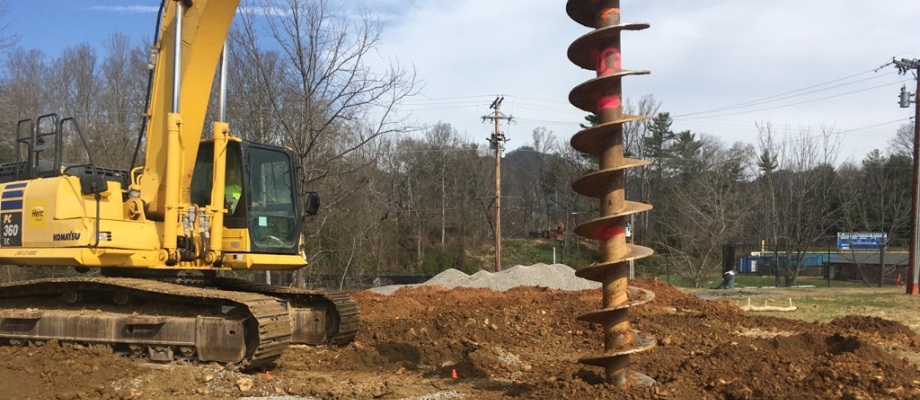Why Employing a Geo Tech Engineer is Crucial for Complex Construction Jobs
Why Employing a Geo Tech Engineer is Crucial for Complex Construction Jobs
Blog Article
The Interdisciplinary Approaches in the Geotechnical Sector: Bridging the Void In Between Engineering, Geology, and Environmental Science for Ideal Task End Results
The combination of engineering, geology, and environmental scientific research within the geotechnical market is not just beneficial; it is essential for attaining optimum job end results. What strategies might arise to facilitate this crucial partnership and boost the effectiveness of geotechnical practices?
Relevance of Interdisciplinary Collaboration
The importance of interdisciplinary cooperation in the geotechnical market can not be overstated. Effective geotechnical projects need the integration of varied knowledge from numerous fields, consisting of engineering, geology, and environmental science. This partnership makes sure that all aspects of a job are considered, bring about comprehensive solutions that resolve intricate challenges.
When functioning in seclusion,Interdisciplinary partnership cultivates advancement by making it possible for experts to share insights and methodologies that may not be noticeable. By leveraging the strengths of numerous techniques, groups can identify possible threats, maximize style procedures, and boost the sustainability of geotechnical jobs. Such cooperation advertises an all natural understanding of site-specific problems, which is critical for accurate assessment and decision-making.
The complexity of geotechnical jobs necessitates a coordinated technique to analytic. Inevitably, interdisciplinary collaboration is crucial for advancing ideal methods and accomplishing excellence in the geotechnical market.
Secret Roles of Each Technique
Cooperation amongst different self-controls is not simply beneficial; it is important for the successful execution of geotechnical projects. Each discipline-- design, geology, and environmental science-- plays a distinct yet interconnected role that adds to project effectiveness and sustainability.
Geotechnical engineers are largely in charge of creating structures and making sure architectural integrity. They assess dirt and rock residential properties to assess load-bearing abilities, providing important data for secure building and construction methods. Their expertise makes it possible for the formula of ingenious remedies to complicated challenges.

Environmental researchers analyze the potential influences of construction on ecosystems and water sources. They carry out ecological analyses and develop reduction approaches to reduce adverse impacts. By integrating eco-friendly factors to consider, they ensure compliance with laws and advertise sustainability throughout the job lifecycle.
Situation Research Studies of Successful Assimilation
Effective integration of geotechnical self-controls can be exemplified through different instance researches that highlight the performance of teamwork in dealing with complicated design difficulties. One noteworthy example is the construction of the Hong Kong-- Zhuhai-- Macau Bridge, where a collective method entailing geotechnical design, geology, and ecological science was essential. Geologists and designers operated in unison to evaluate the seabed conditions and optimize the structure style, ensuring stability and minimizing ecological effect.
Another impactful situation is the enhancement of incline security in the San Francisco Bay Location, where an interdisciplinary group integrated geotechnical analysis with environmental assessments. By integrating hydrological studies and geological studies, the team successfully determined possible landslide threats and executed efficient mitigation actions, enhancing safety and security and sustainability.
Moreover, the redevelopment of Brownfield websites commonly needs a multidisciplinary strategy. In one instance in Chicago, partnership among geotechnical engineers, ecological researchers, and city planners resulted in the successful removal of polluted soil, enabling the secure improvement of the site into a community park. These study illustrate that interdisciplinary partnership not just addresses technological difficulties but likewise fosters innovative solutions that profit both areas and projects.
Challenges in Multidisciplinary Projects

In addition, working with schedules and process amongst numerous teams can be bothersome, particularly when each that site discipline has one-of-a-kind job milestones and deliverables. This misalignment can cause delays and raised costs. The obstacle of resource allowance additionally impends huge; making sure that specific proficiency is offered at important times needs careful planning and insight.
Finally, governing conformity poses another substantial difficulty. Each technique may face various governing frameworks, and aligning these demands to satisfy task purposes can be taxing and complicated. Dealing with these obstacles demands solid management site web and effective interaction approaches to promote partnership and ensure that multidisciplinary teams work cohesively in the direction of shared objectives.
Future Trends in Geotechnical Practices
As the geotechnical sector develops, arising trends are improving techniques to deal with the challenges encountered in multidisciplinary tasks - geotechnical engineers. One considerable fad is the boosted integration of innovative technologies, such as synthetic intelligence and artificial intelligence, right into geotechnical analysis and design. These innovations improve predictive modeling and risk evaluation, allowing engineers to make more enlightened decisions throughout the job lifecycle

In addition, the fostering of digital doubles and real-time surveillance systems is ending up being much more widespread. These devices facilitate ongoing assessment of dirt problems and architectural efficiency, permitting prompt treatments when concerns occur.
Verdict
In conclusion, the combination of engineering, geology, and ecological science is essential for attaining optimal outcomes in the geotechnical market. Effective case research studies illustrate the benefits of this approach, while acknowledging the challenges encountered in multidisciplinary projects.
The assimilation of engineering, geology, and ecological science within the geotechnical sector is not merely helpful; it is crucial for attaining ideal project outcomes. Efficient geotechnical jobs call for the assimilation of varied knowledge from different areas, including engineering, look these up geology, and environmental science.Browsing the complexities of multidisciplinary tasks in the geotechnical market presents numerous considerable challenges.As the geotechnical market advances, emerging patterns are improving practices to address the challenges encountered in multidisciplinary tasks. Geotechnical engineers are progressively teaming up with ecological researchers to make sure that projects straighten with sustainability objectives and conform with regulative requirements.
Report this page